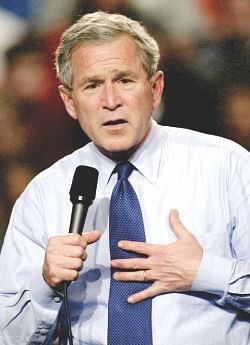| Home - Back Issues - The Team - Contact Us |
 |
| Volume 10 |Issue 40 | October 21, 2011 | |
|
|
International Bush caught in Bushfire Shah Husain Imam
George W Bush had ordered war on Afghanistan and Iraq including hounding out of terrorists during his two terms as US President following the apocalyptic 9/11. The Afghan invasion was triggered by terrorist attacks at the US heartland and the war against Iraq followed on a pack of lies of a premise that Saddam possessed Weapons of Mass Destruction (WMD). By an unsurprising twist of fate, George Bush is now at pains to avoid being hounded by conscionable rights groups. In the classics of falls from the gung-ho into the Hwang Ho (the once-sorrow of China), Bush's name appears to have formally got on to the list of infamy. So much so that he had to call off a trip to Switzerland planned for February amid threats of protests by Human Rights groups over his administration's treatment of detainees at Guantanamo Bay. Even a warrant for his arrest rent the air. A Guardian story by Ewen MacAskill and Afua Hirsch stated, “The visit would have been Bush's first to Europe since he admitted in his autobiography, Decision Points, in November that he had authorized the use of waterboarding – simulated drowning – on detainees at Guantanamo accused of links with al-Qaida.” According to CBC News of September 15, a Bush speech scheduled to be delivered at Tyndale University College and Seminary in Toronto had to be abruptly cancelled. Ostensibly as a face-saving getaway it was explained away as being 'due to scheduling change.' The authorities defending the decision 'in a spirit of free speech and thought', nonetheless caved in to a number of former students of the university circulating a petition to condemn the planned event. Then came Amnesty International formally into the picture. It called upon the Canadian authorities on October 14 'to arrest and prosecute George W. Bush, saying the former US President authorised “torture” when he directed the US-led War on Terror.' Bush was scheduled to attend an economic summit in Surrey in Canada's Westernmost British Columbia province on October 20, so informed an AFP report. The Amnesty statement predicated perceived Canadian obligation to act against Bush on the US authorities' failure to bring the former president to justice. But it is argued by Bush proponents that the American responsibility to try Bush is ruled out by an immunity the US President enjoys for his actions in office. But this immunity of his other governments may not quite feel obliged to respect when and if Bush would have travelled to a foreign land. Which is why Bush fought shy of making it to either Switzerland or Canada. What basically debunked the principle of absolute immunity was the arrest of the Chilean dictator Augusto Pinochet in London in 1998. Britain had to act on an extradition request by Spain over the killings of Spanish citizens in Chile when Pinochet was in power. Actually, US politicians came under the radar following 'the opening of the Guantanamo Bay detention centre, the invasion of Iraq and revelations of secret CIA prisons overseas and rendition flights'. We have it from a Guardian report that when Donald Rumsfeld faced a prospect of arrest in Germany for war crimes relating to abuse at Abu Gharib prison in Iraq, he 'threatened to pull out of a prestigious defence conference in Munich until German prosecutors assured him that he would not be apprehended.' It may be a rare occurrence that individuals with an inordinate amount of power bestowed upon them will be held accountable for their misdeeds in the general culture of impunity that many such individuals enjoy. But when they are responsible for gross crimes against humanity at some point in time, although it may seem a lifetime, their unscrupulous acts will catch up with them. Whether Bush will actually pay his debt to society for wreaking such havoc on the world, only time will tell. The writer is Associate Editor, The Daily Star.
Copyright
(R) thedailystar.net 2011 |
